人教版初一七年级上册英语《 Unit6 Do you like bananas 课件PPT》
人教版七年级上册英语讲义 Unit 6 Do you like bananas

Unit 6 Do you like bananas? 讲义一、【重点单词】banana /bə'nɑ:nə/香蕉hamburger /'hæmbɜ:(r)ɡə(r)/汉堡包tomato /tə'mɑ:təʊ/西红柿ice-cream /,aɪs'kri:m/冰激凌salad /'sæləd/沙拉strawberry /'strɔ:berɪ/草莓pear /peə(r)/梨milk /mɪlk/牛奶bread /bred/面包birthday /'bɜ:(r)θdeɪ/生日dinner /'dɪnə(r)/(中午或晚上吃的)正餐week /wi:k/周;星期food /fu:d/食物sure /ʃʊə(r)/当然;肯定;一定burger /'bɜ:(r)ɡə(r)/汉堡包= hamburgervegetable /'veʤtəbəl/蔬菜fruit /fru:t/水果right /raɪt/正确的;适当的apple /'æpl/苹果then /ðen/那么egg /eɡ/蛋;鸡蛋carrot /'kærət/胡萝卜rice /raɪs/大米;米饭chicken /'ʧɪkɪn/ji鸡肉so /səʊ/ (引出评论或问题)那么breakfast /'brekfəst/早餐;早饭lunch /lʌnʧ/午餐star /stɑ:(r)/明星;星星eat /i:t/吃well /wel/好;令人满意的habit /'hæbɪt/习惯healthy /'helθi/健康的really /'ri:əli/真正地question /'kwesʧən/问题want /wɒnt/需要;想要be /bi:/变成fat /fæt/肥的;肥胖的二、【重点短语】1. John ’s birthday dinner 约翰的生日宴会2. vegetable salad 蔬菜沙拉3. two tomatoes 两个西红柿4. eat well 吃得营养5. think about 考虑6. eat/have breakfast/lunch/dinner 吃早/午/晚饭7. sports stars 体育明星8. the volleyball star 排球明星9. ask sb. about sth. 问某人某事10. like hamburgers/ice-cream 喜欢汉堡包/冰淇淋11. like eating eggs 喜欢吃鸡蛋12. her eating habits 她的饮食习惯13. be (not) healthy (不)健康14. one last question 最后一个问题15. healthy food 健康食物16. after breakfast/lunch/dinner 早/午/晚饭后17.one last question 最后一个问题18.some fruit 一些水果19.for dinner 作为晚餐20.how about 怎么样三、【重点句型】1.—Do you like salad? 你喜欢沙拉吗?一Yes,I do. /No, I don’t. 是的,我喜欢。
人教版七年级上册英语unit6doyoulikebananas
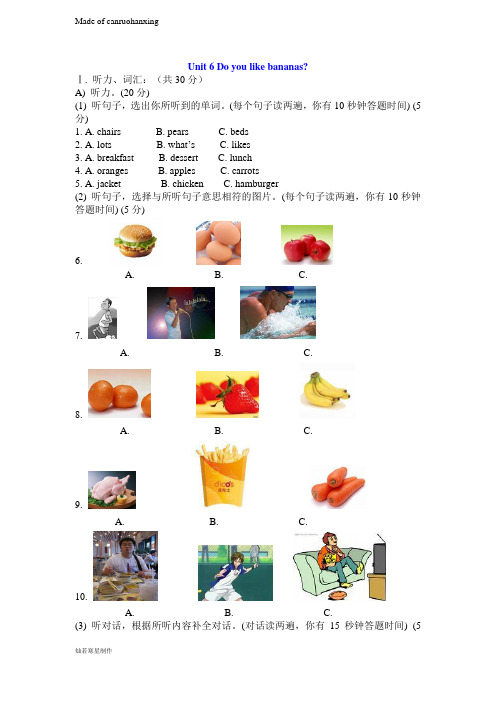
Unit 6 Do you like bananas?Ⅰ. 听力、词汇:(共30分)A) 听力。
(20分)(1) 听句子,选出你所听到的单词。
(每个句子读两遍,你有10秒钟答题时间) (5分)1. A. chairs B. pears C. beds2. A. lots B. what’s C. likes3. A. breakfast B. dessert C. lunch4. A. oranges B. apples C. carrots5. A. jacket B. chicken C. hamburger(2) 听句子,选择与所听句子意思相符的图片。
(每个句子读两遍,你有10秒钟答题时间) (5分)6.A. B. C.7.A. B. C.8.A. B. C.9.A. B. C.10.A. B. C.(3) 听对话,根据所听内容补全对话。
(对话读两遍,你有15秒钟答题时间) (5分)W: Hey, Jack. What are these?M: They are (11) _____.W: Do you like them?M: No, I don’t. But my (12) _____ likes them.W: What fruit do you like?M: I like (13) _____. What about you, Jenny?W: I like (14) _____.M: Great. I like them, too. Let’s eat them for (15) _____.W: That sounds good.(4) 听短文,选择正确答案。
(短文读两遍,你有20秒钟答题时间) (5分)()16. Zhao Xiaobo is _____.A. a Chinese boyB. Tom’s Chinese nameC. Zhao Hui’s brother()17. Tom is _____.A. ten years oldB. Yang Bo’s cousinC. a runner()18. Tom likes _____ for dinner.A. eggs and applesB. tomatoes and hamburgersC. carrots and chicken()19. Zhao Hui likes playing _____.A. baseballB. basketballC. volleyball()20. Yang Bo likes _____.A. French firesB. hamburgersC. chickenB)词汇。
人教版七年级上册英语Unit6 Do you like bananas--讲义
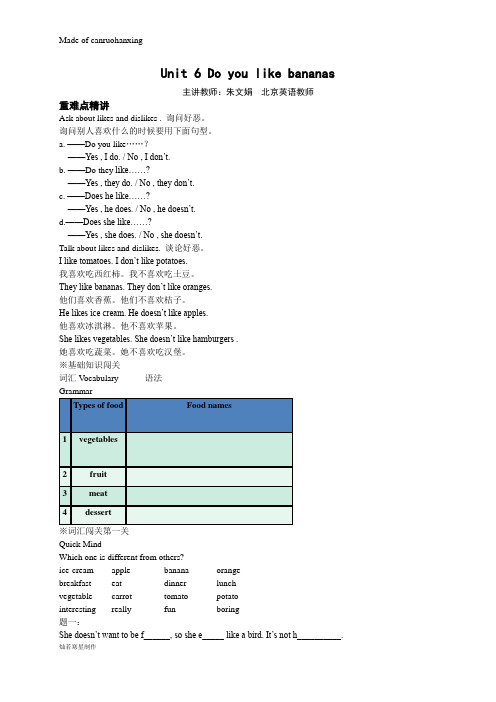
Unit 6 Do you like bananas主讲教师:朱文娟北京英语教师重难点精讲Ask about likes and dislikes . 询问好恶。
询问别人喜欢什么的时候要用下面句型。
a. ——Do you like……?——Yes , I do. / No , I don’t.b. ——Do they like……?——Yes , they do. / No , they don’t.c. ——Does he like……?——Yes , he does. / No , he doesn’t.d.——Does she like……?——Yes , she does. / No , she doesn’t.Talk about likes and dislikes. 谈论好恶。
I like tomatoes. I don’t like potatoes.我喜欢吃西红柿。
我不喜欢吃土豆。
They like bananas. They don’t like oranges.他们喜欢香蕉。
他们不喜欢桔子。
He likes ice cream. He doesn’t like apples.他喜欢冰淇淋。
他不喜欢苹果。
She likes vegetables. She doesn’t like hamburgers .她喜欢吃蔬菜。
她不喜欢吃汉堡。
※基础知识闯关词汇V ocabulary 语法GrammarTypes of food Food names1vegetables2fruit3meat4dessert※词汇闯关第一关Quick MindWhich one is different from others?ice-cream a pple banana orangebreakfast eat dinner lunchvegetable carrot tomato potatointeresting really fun boring题一:She doesn’t want to be f______, so she e_____ like a bird. It’s not h__________.首字母填空A: You don’t l_______ eggs?What a ________chicken?B: Oh, I like chicken.题二:首字母填空A: Do you like salad?B: Yes, I ______. How about you?A: Well, I ________ ________ vegetable salad, but I like fruit salad.A: _______ your brother like carrots?B: No, ________ ________.A: Does Mary like drinking coffee?B: Yes, she does. But she________ like tea.A: _______ your grandparents have rice for dinner?B: Yes, they _______.题三:Your father ________(want) to ask you some questions.We ________(watch) sports games and _______(play)sports together.A:_______ Liz ______(play) tennis every week?B: Yes, she ________.题四:We have ________ at 11:30. After that, wehave a short break.A. breakfastB. lunchC. dinnerD. supper题五:Where _________ your brother usually ______ lunch?A. do, haveB. are, eatC. does, hasD. does, have能力提升与拓展题六:I’m Dave. I am __1__American student. I study in Beijing. I like Beijing very much. I like to go to theGreat Wall. I also __2__ Chinese food. For breakfast, I like eggs, milk and fruit. For lunch, I like rice and chicken. For __3__, I have some steamed bread and tomato soup with eggs. Chinese food __4__ very good! But I don’t like to use chopsticks because it is so __5__ to use them!1. A. a B. an C. the D. /2. A. like B. likes C. don’t like D. doesn’t like3. A. me B. dessert C. breakfast D. dinner4. A. are B. am C. is D. /5. A. interesting B. boring C. difficult D. fun题七:连词成句1. your/ salad/ like/ does/ brother/?2. do/to/want/not/eat/for/bread/I/breakfast/.翻译句子我们餐前吃点水果沙拉吧!我喜欢吃水果和蔬菜,但不喜欢鸡蛋和牛奶。
人教版七年级英语上册Unit6Doyoulikebananas全套课件

3. Let’s have strawberries and apples then. 那么就让我们吃草莓和苹果吧。
have的用法 ①表示“有;拥有”强调“所属关系”, 其主语通常
为人或物。 ②“have+表示一日三餐的名词” 表示“用餐”。 ③“have+表示食品、饮料等的名词” 表示“吃、喝”。
②orange还可作不可数名词,意为“橙汁”。 *我想要一瓶橙汁。 I’d like a bottle of orange, please.
③orange作形容词,意为“橙色的”。 *我的笔盒是橙色的。 My pencil box is orange.
2a Listen and circle the food you hear.
Yes, I do.
Pair-work Do you like ________?
Yes, I do. / No, I don’t.
Do you like ________? Yes, I do. / No, I don’t.
Language points
1. Do you like bananas?你喜欢香蕉吗?
ice-cream
1a Match the words with the things in the picture.
1. hambergers __d__ 2. tomatoes __i__ 3. oranges __f__ 4. ice-cream __h__ 5. salad __b___ 6. bananas __g___ 7. strawberries __c__ 8. pears ___j__ 9. milk __e___ 10. bread __a__
七年级人教版英语上册Unit6Doyoulikebananas?全单元教案

Unit 6Do you like bananas?Period 1(Section A 1a-1c)Teaching aims1. Learn words and be able to say, read and write them:orange(s), banana(s), strawberry, strawberries, pear(s), apple(s),tomato(es), carrot(s), vegetable(s), hamburger(s), egg(s), ice-cream(s),salad(s), bread, chicken2. Be able to talk about likes and dislikes by using:I/We/They like oranges. He/She likes oranges.I /We/They don’t likebananas. He/She doesn’t like hamburgers.Do you like salad? Yes, I do./No, I don’t.Does he/she like tomatoes? Yes, he/she does. / No, he/she doesn’t.3.Understand the difference between countable nouns and uncountable nouns.Teaching key and difficult points:1.Learn these words and be able to say, read and write them:2.Be able to talk about likes and dislikes by using:I/We/They like oranges. He/She likes oranges.I /We/They don’t likebananas. He/She doesn’t like hamburgers.Do you like salad? Yes, I do./No, I don’t.Does he/she like tomatoes? Yes, he/she does. / No, he/she doesn’t. Moral objects(1)To call students ’ attention to otherserests and’ei n ablet themto care more about classmates.(2)To improve Sts ’communicating skills and enable them to keeptheir health.教学设计备注Step 1. Warm-up and revision(1)Daily greeting to the students(2)Revision: What ’s this/that in English ? What coloris it?T:What ’s this in English? (show a picture of andorange)T:What color is it?Step 2. Presentation –New words.(1)Go on asking: What ’s this/that in English ? Whatcolor is it?T:What ’s this in English? (show a picture of anapple and if the student don’t know it, show thephonetic symbol of the word.)T: Spell it, please.S: A-P-P-L-E.T: What color is it?S: It ’s red.(Present the other three words as above: pear,strawberry, banana )T:We can call all of these things fruit . (Teach the newword “fruit ”.)Show pictures and ask the Ss “What arethese/those? ”and ask the SS to spell the pluralforms of these words: oranges, apples, pears,strawberries, bananas.(2)Repeat step (1) to present: carrot, carrots,tomato, tomatoes and vegetable, vegetables.(3)Present some more words by showing pictures. Get theSs to make an effort to pro nounce and spell the new words.Bread, hamburger ,hamburgers, milk, ice-cream,ice-creams, salad, chicken ,an egg, eggsWe can call all of these things food:食物3.Memory Challenge: Who has the best eyes?(1)Show the pictures, and say the plural forms of the nouns andsome uncountable noun.(2)Summarize. 可数名词有复数形式 , 不可数名词一般没有复数形式Step 3Presentation Target language 11. Show the pictures and say:I like tomatoes, but I don’ t like bread.2.Let students say:I like, but I don’t like ....3. Show the pictures and say:She likes bread, but she doesn’t like milk.He likes chicken, but he doesn’t like eggs.4.Let students say: He/She likes , but he/she doesn’tlike ....According Ss’answers and say:5. Sing a chant:Bananas, bananas, I like bananas! Salad, salad, I like salad!Strawberries, strawberries,I don ’t like strawberries!Pears, pears, he likes pears!Milk , milk, he likes milk!Tomatoes, tomatoes,He doesn ’t like tomatoes! Step 4 Work 1a .1. Read the words.2.T: Look at the pictures and fill in the chart .Fruit Food Vegetable3.Match the words with the things in the picture.4.Check the answers .Step 5 Present the new language 1 .1. T: Oh, we have lots of delicious fruits . I like apples best.Do you like apples ?S1 :Yes , I do. I like apples.S2: No, I don't . I like salad.T: Do you like salad ? S3: Yes , I do. I like salad./ No, I don't . I don’tlike salad.Step 6 Pairwork .1. T: Work in pairs .Ask and answer with your partners .(Before class the students have draw some pictures of the food )2. Get the Ss to ask and answer in pairs, using the sentences:’t.A: Do you like ?B: Yes, I do./ No, I don 3. When you ask andanswer, please fill in the chart. Name Like DislikeStep 7 Present the new language 2 .1.Show pictures and ask and answer questionsDoes she/he like ?Yes, she/he does. She/He likes/ No, she/he doesn ’t. She/He doesn ’tlike .Step 8 Pairwork .1. T: Work in pairs .Ask and answer with your partners .2.Get the Ss to ask and answer in pairs, using the sentences:Does she/he like ?Yes, she/he does. She/He likes/ No, she/he doesn ’t. She/He doesn ’tlike .3.According Ss’answers and ask “Do they like ? Yes, they do./ No, they don’t.”Step 9 Work on 1b.1.T: 1b. List en and number the conversations.2.Listen.3.Check the answers.4.Read after the tape.Step 10 work on 1c.1.First, practice the conversations in 1b.Then, make a survey and fill in the chart below.2. Report: I like milk and tomatoes, but I don’t like ice-cream. Mary likes oranges, but she doesn’liket milk orice-cream. Tom likes tomatoes and strawberries, but hedoesn ’ t like bread.Step 11 . HomeworkWrite down the report.Blackboard design:New Words Unit 6 Do you like bananas?Do you like?Yes , I do. I likeNo ,I don ’t. I don ’tlikeDoes she/he like ?Yes, she/he does. She/He likes/No, she/he doesn ’t. She/He doesn ’tlike.Period 2(Section A 2a-2d)Teaching aims:1. Words & expressionsBirthday, dinner, week, think about, food, sure, how/whatabout ? Burger, vegetable, fruit, apple, then2. Target languageI like strawberries, they’re delicious. Let’s have them.--Yes, I like them ,too./ No, I don’tlike them.I like salad, it ’s delicious. Do you like it?-- Yes, I do./No, I don’t but I likeice cream.Let ’ s have Let ’s think about the food.Ability goalsEnable students to talk about likes and dislikes.Learning ability goalsHelp students learn how to talk about likes and dislikes.2. Listening and speaking skills.Moral object:Learn to keep healthy.Teaching important / difficult pointsHow to talk about likes and dislikes with the target language.教学设计备注Step1 Warm up and revision.1.Everyday greeting.2.Review.Show the pictures and say the singularforms and the plural forms of the countable nouns.3.Show some pictures of the uncountable nouns.4.Summarize.(1).当可数名词复数再次出现时,用“They( 主语)或 them(宾语)”替代。
人教版2020年七年级英语上册Unit6Doyoulikebananas讲义(新版)人教新目标版
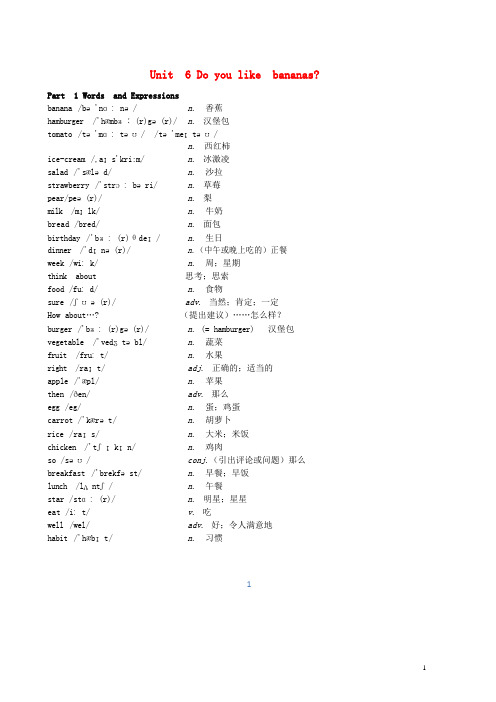
Unit 6 Do you like bananas?Part 1 Words and Expressionsbanana /bə'nɑːnə/ n. 香蕉hamburger /'hæmbɜː(r)gə(r)/ n. 汉堡包tomato /tə'mɑːtəʊ/ /tə'meɪtəʊ/n. 西红柿ice-cream /,aɪs'kri:m/ n. 冰激凌salad /'sæləd/ n. 沙拉strawberry /'strɔːbəri/ n. 草莓pear/peə(r)/ n. 梨milk /mɪlk/ n. 牛奶bread /bred/ n. 面包birthday /'bɜː(r)θdeɪ/ n. 生日dinner /'dɪnə(r)/ n.(中午或晚上吃的)正餐week /wiːk/ n. 周;星期think about 思考;思索food /fuːd/ n. 食物sure /ʃʊə(r)/ adv. 当然;肯定;一定How about…?(提出建议)……怎么样?burger /'bɜː(r)gə(r)/ n. (= hamburger) 汉堡包vegetable /'vedʒtəbl/ n. 蔬菜fruit /fruːt/ n. 水果right /raɪt/ adj. 正确的;适当的apple /'æpl/n. 苹果then /ðen/adv. 那么egg /eg/ n. 蛋;鸡蛋carrot /'kærət/ n. 胡萝卜rice /raɪs/ n. 大米;米饭chicken /'tʃɪkɪn/ n. 鸡肉so /səʊ/ conj.(引出评论或问题)那么breakfast /'brekfəst/ n. 早餐;早饭lunch /lʌntʃ/ n. 午餐star /stɑː(r)/ n. 明星;星星eat /iːt/ v. 吃well /wel/ adv. 好;令人满意地habit /'hæbɪt/ n. 习惯1healthy /'helθi/adj. 健康的really /'riːəli/ adv. 真正地question /'kwestʃən/ n. 问题want /wɒnt/ v. 需要;想要be /biː/ v. 变成fat /fæt/adj. 肥的;肥胖的Part 2:Texts课文(一)Jack: Hey, John’s birthday dinner is next week. Let’s think about the food.Tom: Sure. How about burgers, vegetable salad, and some fruit? Bill: Sounds good. John likes hamburgers.Jack: Oh, I don’t like salad.Bill: But John likes salad, and it’s his birthday.Jack: Yes, you’re right. What about the fruit?Tom: I think John likes strawberries and apples.Jack: OK. Let’s have strawberries and applesthen.Structure——谈论好恶1.Do you like salad? Yes, I do./No, I don’t.2.Do they like pears? Yes, they do./ No, they don’t.3.Does she like tomatoes? Yes, she does./ No, she doesn’t.4.I like oranges. I don’t like bananas.5.We like rice. We don’t like hamburgers.6.He likes ice-cream. He doesn’t like vegetables.重点句型:—Do / Does sb. like…?—Yes, sb. do / does.—No, sb. don’t / doesn’t.sb. like/likes ….sb. don’t/doesn’t like ….Underline the correct words in the brackets.在括号内正确的单词下画线。
人教版七年级上册英语Unit6Doyoulikebananas
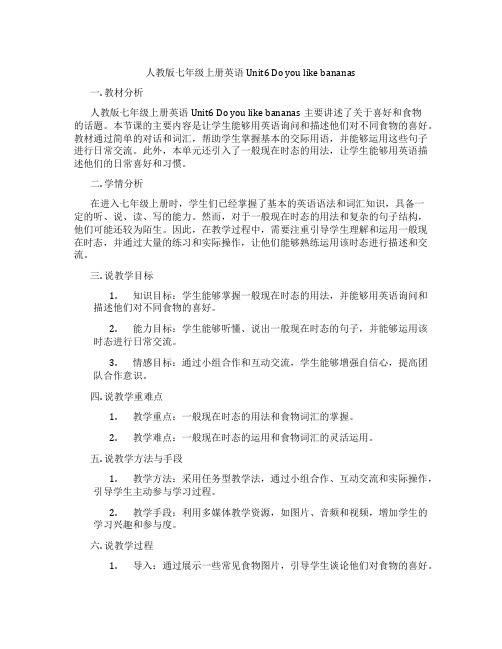
人教版七年级上册英语Unit6 Do you like bananas一. 教材分析人教版七年级上册英语Unit6 Do you like bananas主要讲述了关于喜好和食物的话题。
本节课的主要内容是让学生能够用英语询问和描述他们对不同食物的喜好。
教材通过简单的对话和词汇,帮助学生掌握基本的交际用语,并能够运用这些句子进行日常交流。
此外,本单元还引入了一般现在时态的用法,让学生能够用英语描述他们的日常喜好和习惯。
二. 学情分析在进入七年级上册时,学生们已经掌握了基本的英语语法和词汇知识,具备一定的听、说、读、写的能力。
然而,对于一般现在时态的用法和复杂的句子结构,他们可能还较为陌生。
因此,在教学过程中,需要注重引导学生理解和运用一般现在时态,并通过大量的练习和实际操作,让他们能够熟练运用该时态进行描述和交流。
三. 说教学目标1.知识目标:学生能够掌握一般现在时态的用法,并能够用英语询问和描述他们对不同食物的喜好。
2.能力目标:学生能够听懂、说出一般现在时态的句子,并能够运用该时态进行日常交流。
3.情感目标:通过小组合作和互动交流,学生能够增强自信心,提高团队合作意识。
四. 说教学重难点1.教学重点:一般现在时态的用法和食物词汇的掌握。
2.教学难点:一般现在时态的运用和食物词汇的灵活运用。
五. 说教学方法与手段1.教学方法:采用任务型教学法,通过小组合作、互动交流和实际操作,引导学生主动参与学习过程。
2.教学手段:利用多媒体教学资源,如图片、音频和视频,增加学生的学习兴趣和参与度。
六. 说教学过程1.导入:通过展示一些常见食物图片,引导学生谈论他们对食物的喜好。
2.新课呈现:引入一般现在时态的概念,并通过示例句子让学生理解一般现在时态的用法。
3.对话练习:让学生听录音或观看视频,模仿对话中的句子,并进行角色扮演。
4.小组活动:学生分组进行讨论,用英语询问和描述他们对食物的喜好。
5.巩固练习:通过完成练习题和互动游戏,让学生进一步巩固一般现在时态的用法。
人教版英语七年级上册 Unit 6 Do you like bananas

This is a fruit and vegetable house (果疏屋). What’s in the house? (果蔬屋里有什么?)
some vegetables
some fruits
banana bananas
pear pears
strawberry strawberries
2 A: Do you like salad? B: No, I don’t.
1 A: Do you like bananas? B: Yes, I do.
3 A: Do you like oranges? B: Yes, I do.
Post-listening
1c Practice the conversations with your partner. Then make your own conversations.
2. tomatoes __i _ 3. oranges _f__ 4. ice-cream _h__ 5. salad __b_ 6. bananas _g__
7. strawberries __c_ 8. pears __j_
9. milk __e_ 10. bread _a__
Read the dialogue in the picture.
Read the conversation after the tape.
1. Girl: I like hamburgers. Do you like hamburgers? Boy: Yes, I do.
2. Girl: Do you like tomatoes? Boy: No, I don't like tomatoes.
—Do you like bananas? —Yes, I do. —Do you like salad? —No, I don’t. —Do you like oranges? —Yes, I do.
人教版初一上册英语Unit 6 Do you like bananas

Unit 6 Do you like bananas?一、单词:like banana hamburger tomatobroccoli French fries orange icecream salad strawberry pearegg apple carrot chickenfruit vegetable breakfast lunchdinner runner eat runstar healthy food dessertlist have breakfast lots of ice creamlike doing sth.like to do sth.二、语法重点:1. 表达“喜欢”与“不喜欢”;2. 可数名词与不可数名词。
三、句型:1. ─Do you like salad? ─No, I don’t./Yes, I do.2. ─Do they like French fries? ─Yes, they do. / No, they don’t.3. ─Does he like strawberries? ─Yes, he does. / No, he doesn’t.4. I like oranges.5. They like salad.6. She likes ice cream.基础知识练习(一)翻译下列词组:1.吃早餐_______________________2.吃得好______________________________3.很多朋友_______________________4.赛跑明星____________________________5.列出清单________________________6. 以…做早餐___________________________7.健康食品_______________________ 8.许多,大量(二)用所给单词的适当形式填空:1. They all like (bread), they (not like) rice.2. Do you like (orange)?3. She has (vegetable) and fruit for supper.4. he (have) hamburgers for lunch?5. There are four Americans and ten (Chinese) in his class.6. Julia has a lot of (friend) at school.7. Look! Some chicken on the plate(盘子),and some apples next to the plate. ( be )8. Sandra is a (run) star.(三)单项选择:( ) 1. ----_______?---- No, I don’t.A. Do you like breadB. Do it like thisC. Are you like breadD. Does he like it ( ) 2. she like broccoli?A. DoB. DoesC. IsD. Are( ) 3. I like eggs, tomatoes and bananas for _______breakfast.A. theB. aC. /D. an( ) 4. ---- _______they ______ a new computer? ---- Yes, they like it very much.A. Does ; hasB. Do ; haveC. Does ; haveD. Does ; like ( ) 5. Broccoli and carrots are______.A. fruitsB. fruitC. vegetablesD. vegetable ( ) 6. ---- Is my picture here? ---- ________ .A. Yes, you areB. Yes, it isC. No, they aren’tD. No, he isn’t ( ) 7. Are those in the picture?A. apples treesB. apples treeC. apple treesD. apple tree ( ) 8. “Do you have a basketball?”“______.”A. Yes,I haveB. No,I haven’tC. Yes, I am.D. Yes,I do ( ) 9. He like bananas.A. doB. isC. doesn’tD. not( )10. There is food in the fridge.A. lot ofB. lots ofC. a lots ofD. a lot(四)改错:1.—Do they like eggs? —Yes, they are. ( )A B C D2. Does you brother like sports? ( )A B C D3. I have five oranges, and Dave has six tomatos. ( )A B C D4. Broccoli is a healthy food. ( )A B C D5.—What’s she like? —Sports. ( )A B C D能力提升(一)单项选择:( ) 1. My brother Jack _______like flying kites ________playing chess.A. don’t;orB. don’t;andC. doesn’t;orD. doesn’t;and ( ) 2. My brother very much.A. like bananaB. likes bananas C.like bananas D. likes banana ( ) 3. We can buy some apples in those shop.A. fruitsB. fruitC. fruit’sD. fruits’( ) 4. There is some on the table.A. bananaB. chickenC. tomatoesD. apple( ) 5. A lot of chicken on the plate.A. areB. isC. standD. play( ) 6. The lunch in our school ______ good .A. areB. doesC. isD. /( ) 7. Tom eats .A. goodB. badC. muchD. many( ) 8. Emma and Paul French fries.A. is likeB. likesC. are likeD. like( ) 9. What she have dinner?A. does; /B. does; forC. do; forD. do; at( ) 10. The baby is . It often laughs(笑).A. hungryB. thirstyC. healthyD. health( ) 11. People in American eat much .A. coffeeB. onionsC. beefD. iced water(冰水)( ) 12. ---- Would you like some .? ---- Yes, please. I’m a little thirsty.A. breadB. meatC. appleD. orange(二)句型转换:1. My father has lunch at home. (改为否定句)My father________ ________ lunch at home.2. There are many books in the drawer. (改为同义句)There are ________ ________ books in the drawer.3. Jenny likes eggs. (改为一般疑问句并作否定回答)________ Jenny ________ eggs? ---- No, ________ ________.4. She eats fruits and hamburgers for lunch. (就划线部分提问)________ ________ she for lunch?5. my ,egg, every, an, breakfast, has, for, day, uncle (连词成句)______ __ .6. My parents like tomatoes. (改为一般疑问句并作肯定回答)________ ________ parents tomatoes? ---- Yes, ________ ________.(三)汉译英:根据所给汉语意思,完成下列句子:1.盘子里有很多花椰菜。
英语七年级上册Unit6Doyoulikebananas人教版七年级上unit6课件

I couldn’t think of the name of that man. 我想不出那人的名字来了。
Let’s think of some questions about life. 让我们对生活设想一些问题吧。
4. sure adv. (副词)当然;肯定;一定 常用来回答一般疑问句,意为“当然; 的确”,相当于yes或certainly。只是 sure 在英国英语中较为常用,而在美国 英语中常用certainly。
Jack: Hey, John’s birthday dinner is next week.
Let’s think about the food.
Tom: Sure. How about burgers, vegetable salad,
and some fruit?
2d
Bill: Sounds good. John likes hamburgers.
last week 上礼拜
this week 本周
next week 下周
3. think about 思考,思索
(一般是短时间的较仔细的考虑) What do you think about that? 你认为怎么样? I’ll have to think about it. 我得想一想。
think of 想到;想象;设想 多用来指“想起,认为”。
Countable nouns Uncount- Countable and
able uncountable
nouns nouns
hamburgers, e_g_g_s milk _o_r_a_n_g_e_s__a_p__p_le_s_ bread _b_a_n_a_n__a_s__p_e_a_r_s_ rice _ca_r_r_o_t_s__t_o_m_a__to_e_s _v_e_g_e_t_a_b_le_s______
人教版(PEP义务教育版)初一英语七年级上册人教版 Unit 6 Do you like bana

22
好好学习 天天向上
23
Eat healthy food!
要多吃健康食品 , 少吃垃圾食品哦
好好学习 天天向上
24
好好学习 天天向上
25
Homework
运用今天所学的单词和句型,对你的家人进行 一个关于食物喜好的调查,并写好书面报告。
好好学习 天天向上
26
谢谢聆听
好好学习 天天向上
27
谢谢观看
icecream
orang es
pears
hambyr gers
bana nas
Do you like milk?
No, I don't.
strawber ries
tomato es
salad
milk
bread
好好学习 天天向上
19
如何询问和表达自己的喜好
—Do you like...? —Yes, I do. -No,I don't.
学 目
2) 能掌握以下句型: — Do you like salad? — Yes, I do. / No, I don’t.
重点
标
2.过程与方法: 1)了解可数名词和不可数名词的区别
2)能通过介绍食物学会询问对方喜欢与不喜欢的食物
难点
3. 情感态度价值观目标:
引导学生养成良好的饮食习惯,多吃健康食物,少吃垃圾食品。
conversations[1-3].
听录音,为对话编号
2
1
A:Do you like salad? B: No,I don't.
A:Do you like bananas? B: Yes,I do.
七年级英语Unit 6Do you like bananas 人教版(新目标)知识精讲

初一英语Unit 6 Do you like bananas? 人教版(新目标)【本讲教育信息】一. 教学内容:Unit 6 Do you like bananas?(一)语言目标谈论爱好和厌恶。
(二)语言功能学会用英语表达自己喜欢或不喜欢的东西,询问别人是否喜欢,提出建议。
(三)重点句型Do you like bananas? Yes, I do./No, I don’t.I like French fries. I don’t like tomato es.(四)主题词表(五)重点词汇及短语词汇:like, hamburgers, tomatoes, broccoli, French fries, oranges, ice cream, salad, bananas, eggs, carrots, strawberry, apples, chicken, breakfast, lunch, dinner, fruit, vegetable.短语:a lot of like to do sth. like doing sth.(六)语法1. 动词like的用法。
2. 一般疑问句的肯定、否定回答。
3. 名词复数的使用。
(七)重难点分析:1. 可数名词和不可数名词(1)可数名词:①定义:是可以计数的名词。
②可数名词前可以用a,an限定。
③可数名词前可以用one,two,three…限定。
④可数名词有复数形式。
(2)不可数名词:①定义:指不能计数的名词。
②不可数名词前不可以用a,an限定。
③不可数名词前不可以用one,two,three…限定。
④不可数名词没有复数形式。
2. 一般名词的复数形式(1)一般在名词词尾加-s。
如:banana-bananas(2)以-o,-s,-sh,-ch及-x结尾的名词,在词尾加-es构成复数形式。
如:tomato-tomatoes (3)有些以-o结尾的名词仍加-s。
人教版七年级英语上册unit6Do you like bananas
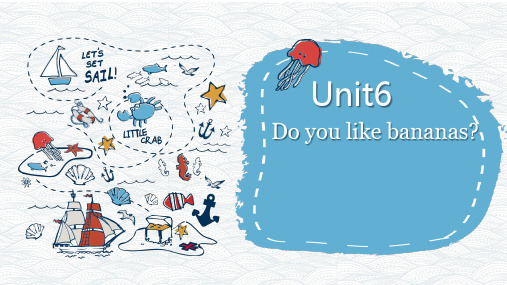
tomatoes
Part
Two
不可数名词
(uncountable noun)
milk
ice cream
salad
Part Two
1a Can you match the words with
the things in the picture? 1. hamburgers 2. tomatoes 3. oranges 4. ice-cream 5. salad 6. bananas 7. strawberries 8. pears 9. milk 10.bread
hamburgers pears tomatoes strawberries
oranges ice cream salad
bananas
Part Three
2b Listen again. Fill in the blanks.
tomatoes
ice cream ice cream
tomatoes
Unit6
Do you like bananas?
C O N
目T E
录N T S
Part One
Warm-up & Review
Part Three
Consolidation & Extension
Part Two
Presentation & Practice
Part Four
Conclusion & Homework
Part Four
Conclusion & Homework
Part Four
banana hamburger tomato icecream salad strawberry pear milk bread food
最新人教版英语初中七年级上册Unit 6 Do you like bananas
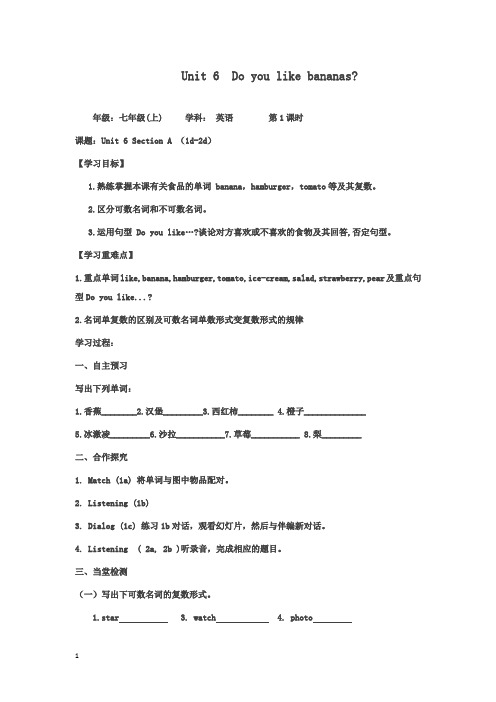
Unit 6 Do you like bananas?年级:七年级(上) 学科:英语第1课时课题:Unit 6 Section A (1d-2d)【学习目标】1.熟练掌握本课有关食品的单词 banana,hamburger,tomato等及其复数。
2.区分可数名词和不可数名词。
3.运用句型 Do you like…?谈论对方喜欢或不喜欢的食物及其回答,否定句型。
【学习重难点】1.重点单词like,banana,hamburger,tomato,ice-cream,salad,strawberry,pear及重点句型Do you like...?2.名词单复数的区别及可数名词单数形式变复数形式的规律学习过程:一、自主预习写出下列单词:1.香蕉________2.汉堡_________3.西红柿________4.橙子______________5.冰激凌_________6.沙拉___________7.草莓___________8.梨_________二、合作探究1. Match (1a) 将单词与图中物品配对。
2. Listening (1b)3. Dialog (1c) 练习1b对话,观看幻灯片,然后与伴编新对话。
4. Listening ( 2a, 2b )听录音,完成相应的题目。
三、当堂检测(一)写出下可数名词的复数形式。
1.star 3. watch 4. photo5.backpack6.tomato7.key8. bus 9.strawberry 10.dictionary11.wife_________ 12.sheep____________ 13.hero____________14.Chinese___________________(二)用所给单词的正确形式填空。
1. There are four _________ ( tomato) in the drawer.2. Jeff likes ____________( strawberry ) very much.3. Are these ____________( you) oranges.4. I ______________ (not like ) math. (三)单项选择。
人教版七年级上册英语 Unit 6 Do you like bananas?
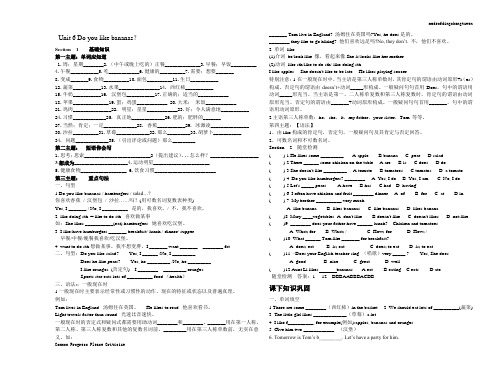
madeofdingshangtuwenUnit 6 Do you like bananas?Section 1 基础知识第一主题:单词应知道1.周;星期________2.(中午或晚上吃的)正餐______________3.早餐;早饭__________4.午餐___________5.吃____________6.健康的__________7.需要;想要_______8.变成_______9.食物__________10.面包__________11.生日___________12.蔬菜___________13.水果________________14. 西红柿___________15.牛奶___________16. 汉堡包___________17.正确的;适当的____________18.苹果______________19.蛋;鸡蛋____________ 20.大米;米饭____________21.鸡肉_______________22. 明星;星星____________23.好;令人满意地___________ 24.习惯_____________25. 真正地_____________26.肥的;肥胖的_______27.当然;肯定;一定_____________28. 香蕉___________29. 冰激凌_______________ 30.沙拉__________31.草莓_____________32.那么_________33.胡萝卜___________34. 问题_____________35.(引出评论或问题)那么_________第二主题:短语你会写1.思考;思索__________________________2.(提出建议)...怎么样?___________________3.想成为_____________________4.运动明星______________________5.健康食物__________________6.饮食习惯________________________第三主题:重点句法一、句型1.Do you like bananas / hamburgers / salad…?你喜欢香蕉/ 汉堡包/ 沙拉……吗?(用可数名词复数表种类)Yes, I _______ / No, I __________. 是的,我喜欢。
- 1、下载文档前请自行甄别文档内容的完整性,平台不提供额外的编辑、内容补充、找答案等附加服务。
- 2、"仅部分预览"的文档,不可在线预览部分如存在完整性等问题,可反馈申请退款(可完整预览的文档不适用该条件!)。
- 3、如文档侵犯您的权益,请联系客服反馈,我们会尽快为您处理(人工客服工作时间:9:00-18:30)。
Period 3
Go for it Book 1
绿色圃中小学教育网
Task 1 Talk about your lunch
A: Do you like rice for lunch?
B: Yes, I do. /No, I don’t
绿色圃中小学教育网
Task 5 Listening
• 听对话,填写下表
NAME × FOOD BREAKFAST LUNCH SUPPER
Bread Milk
绿色圃中小学教育网
Noodles Porridge
Helen DRINK
Fish RMB 3
Bananas RMB 0.5
Peaches RMB 0.8
Watermelon RMB 0.5
Oranges
RMB 0.8
Apples RMB 0.7
绿色圃中小学教育网
Task 4 Talk about your family’s favourite food
• • • •
A: Do you like bananas? B: Yes, I do. A: Do you like salad? 绿色圃中小学教育网 B: No, I don’t.
Task 3 Make a menu
• Do you like the fast food? Why?
A bottle of apples Coke juice
绿色圃中小学教育网
• What do you have for lunch every day?
Name Food for lunch
绿色圃中小学教育网
Task 2 Food they like or don’t like
绿色圃中小学教育网
Discuss which dishes, main food and fruit they like and give their reasons.
dishes 1 2 3 why
main food fruits
绿色圃中小学教育网
• I like fish. Do you like fish? • He likes fish. She likes fish. • He doesn’t like fish. She doesn’t like fish.
绿色圃中小学教育网
绿色圃中小学教育网://
Shrimps
RMB 3.5
Mushroom and bean curd RMB 1
Beans RMB 1.5 Chicken RMB 3 Rape RMB 1
Mushroom and cabbage RMB 1.5 Egg plant and green pepper RMB 1.5
绿色圃中小学教育网
